La Granja Labrada: Sara Gascón’s equestrian haven in Galicia, where nature and a passion for horses come together for a unique experience.
Autor: Natalia Imberti Fecha: 10/10/2024
Project History and Origins

-
What is the story behind the farm and the equestrian center? How did it all start?
- What kind of activities do you offer for those interested in horses and riding, and what do you consider when designing the activities or routes?
- What level of experience is required to participate in your activities, and do you offer specific programs for each level?
- What facilities do you have for horses and guests staying at the center?
- What type of accommodation do you offer for guests? Are there different options?
- What kind of food and services are included during the stay?
- What is the minimum and maximum age for participating in your activities?
- Do you have special programs for families or groups?
- Where do your guests typically come from, both internationally and within Spain?
- What is the typical length of the horse riding vacations you offer?
- Do you offer other activities beyond horseback riding?
- Do you offer riding training or lessons during the stay?
- Do you have any horse care and training programs for those interested in working with horses?
- Do you breed your own horses? What breeds do you work with, and do you handle the training yourselves?
- What is the center's main philosophy in terms of horse care and riding?
- What safety measures are in place to ensure the safety of both guests and horses?
- What motivates visitors to come to the center and participate in your activities?
- Have you traveled around Spain or other parts of the world for horseback riding vacations? How do you see the current development of equestrian tourism, and what do you think about its future in Spain and Galicia?
- Have you ever been to Argentina, or is it a place you'd like to visit?
- Do you know the Peruvian Paso Horse breed? Have you ever ridden one?
The current project began in 2019 with the purchase of an old farm located in a small Galician village in the middle of nature.
Ten hectares of land and a large stone house to restore: 3 horses, 15 chickens, 3 dogs, 2 brave women, and a lot of enthusiasm.
For several years, we had been combining our professional activities with organizing equestrian courses and events. In 2019, we decided to take the leap and turn our passion into a life project. Today, we have a fully renovated unique space, 20 wonderful horses that are part of our family, and an unparalleled environment where guests can unwind, escape the routine, and reconnect.
The renovation project faced significant delays due to the pandemic, which added to the challenges of such a large project, along with global uncertainties. I won’t deny that there were days when we doubted everything...
Now, looking back, I feel fortunate and grateful for every decision that has allowed us to share this hidden piece of paradise with our guests, located in one of the most beautiful and wild areas of Galicia, which can only be truly discovered on horseback with one of our amazing horses.
Activities and Programs Offered

We offer vacation and training packages that include accommodation in a fully restored traditional rural house, seasonal local food, and horseback riding in a unique natural environment.
The vacation packages include wonderful rides ranging from 3 hours to a full day to explore the region, while the training packages combine ground work and riding lessons with field outings.
It is also possible to book services separately and come for a single ride or stay with us in this wonderful setting.
Improving the world of horses is important to us, which is why we offer numerous courses throughout the year with different professionals. We always aim to work with respect and understanding to improve communication and the relationship with the horse. Last September, for instance, we brought in Eugenia Fuentes, a fellow countrywoman of yours who is truly amazing.
We have programs for all levels, from those who have never ridden and want to get started in the world of horses and equestrian travel, to more intense experiences for riders who enjoy good gallops and long hours in the saddle.
We take special care in forming groups to ensure that the levels are well-matched so that everyone can enjoy an experience suited to their level and expectations.
Facilities and Accommodation
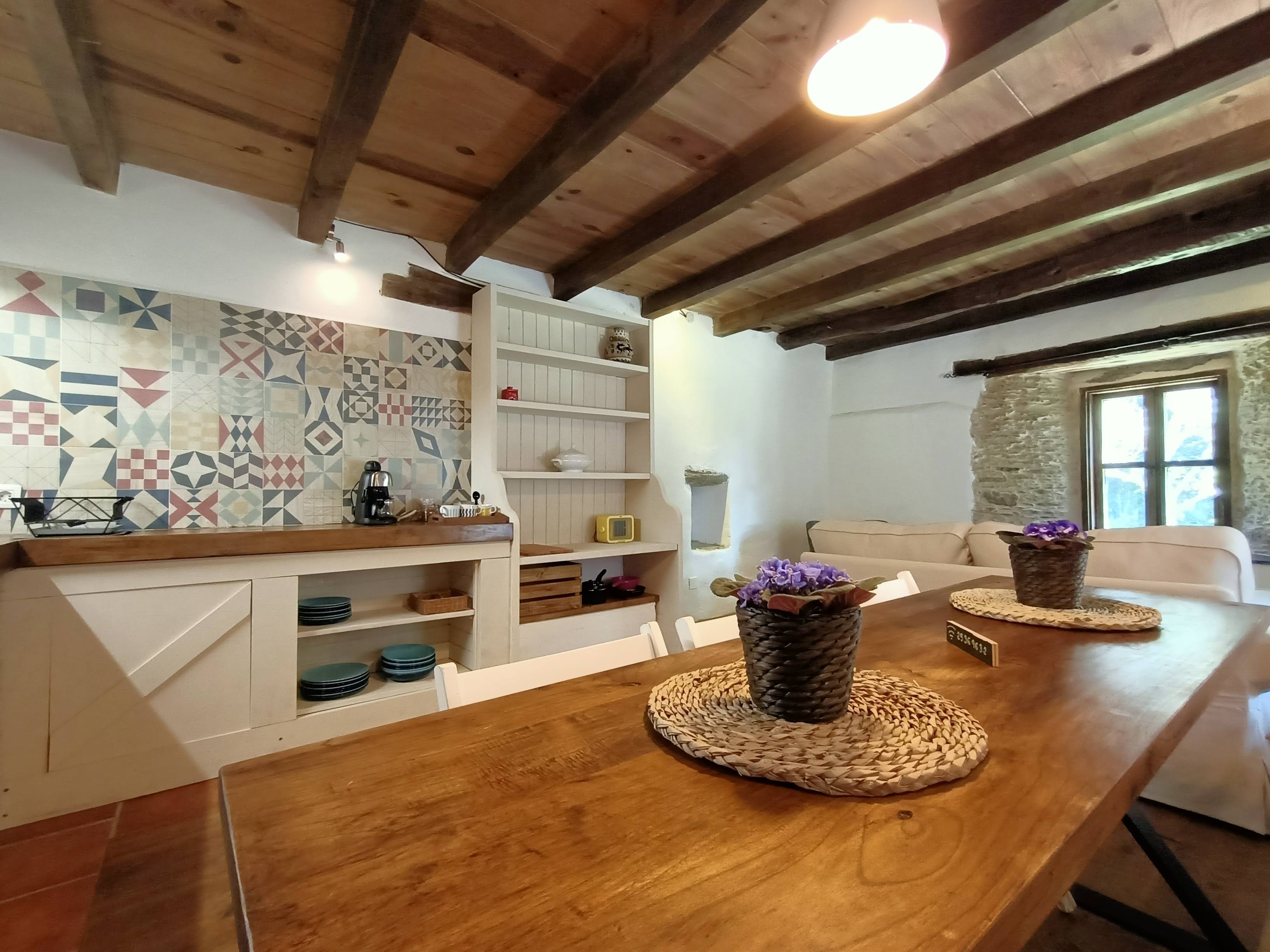
Our horses live in semi-freedom in a 10-hectare Paddock Paradise that surrounds the equestrian facilities.
They have access to open shelters, forested areas, pasture, numerous water points, and large spaces where they live in herds, leading as natural a life as possible.
The equestrian area, where activities take place, includes an 18-meter round pen, a 30x20 covered arena, a natural obstacle course with small steps, jumps, and a natural lake. In the same space, we have the tack room, preparation area, our canteen/common room, and parking.
The accommodation area (located just 100 meters from the equestrian area and the horses' living area) has a traditional Galician rural house built of stone and wood, which we lovingly restored to provide all modern comforts while maintaining the essence of traditional construction.
Next to the accommodation, there are two additional parking areas for guest convenience.
We offer two options:
Rooms with private bathrooms, a shared garden, and access to all common areas. This is the preferred option for guests who want to enjoy breakfast and dinner services and prefer not to cook during their vacation.
An apartment with its own kitchen, private garden, and access to all common areas. This is the favorite option for groups who prefer to organize themselves, cook at their own pace, or enjoy a barbecue in the garden.
Food and Additional Services
We offer half-board packages (breakfast + dinner) and full-board packages (breakfast + lunch + dinner).It is also possible to stay without booking meals and instead enjoy the local cuisine.
All our menus feature seasonal local products, with simple, delicious recipes prepared with care to showcase the best of our gastronomy.
Depending on the package, classes or rides are included, as well as personal protective equipment for the activity.
All our guests have access to common areas (equestrian area, canteen, parking, gardens) where they can relax in a friendly and peaceful environment.
We offer vacation packages for riders aged 11 and up, with no maximum age—it's all about your physical ability. If you're fit enough to ride a horse, there’s a place for you!
Guests who do not participate in the package activities are always welcome and can enjoy independent activities or simply relax in a hammock or take a stroll around the area while their companions ride.
Yes, we offer packages for groups of 4 to 16 people, ideal for families and groups of friends.
Internationally, we often receive guests from Germany, France, Switzerland, and the U.S.
Within Spain, we have many visitors from other parts of Galicia, as well as from Madrid, Barcelona, Andalusia, and Valencia.
Subscribe to the Ampascachi Community and obtain benefits and exclusive content. Furthermore, we offer free advice on horses and equestrian tourism.
Most of our packages include 4 or 5 nights as a base, but they can be personalized to add extra nights.
Other Complementary Activities

At the farm, we occasionally host painting and craft workshops, live music sessions, or yoga classes to enhance our guests' stay (depending on the season).
In the surrounding area, there are plenty of outdoor activities available, such as kayaking, surfing, paddle surfing, biking, and hiking. There are also numerous food festivals and popular celebrations, especially from May to September.
Equestrian Philosophy and Horse Care
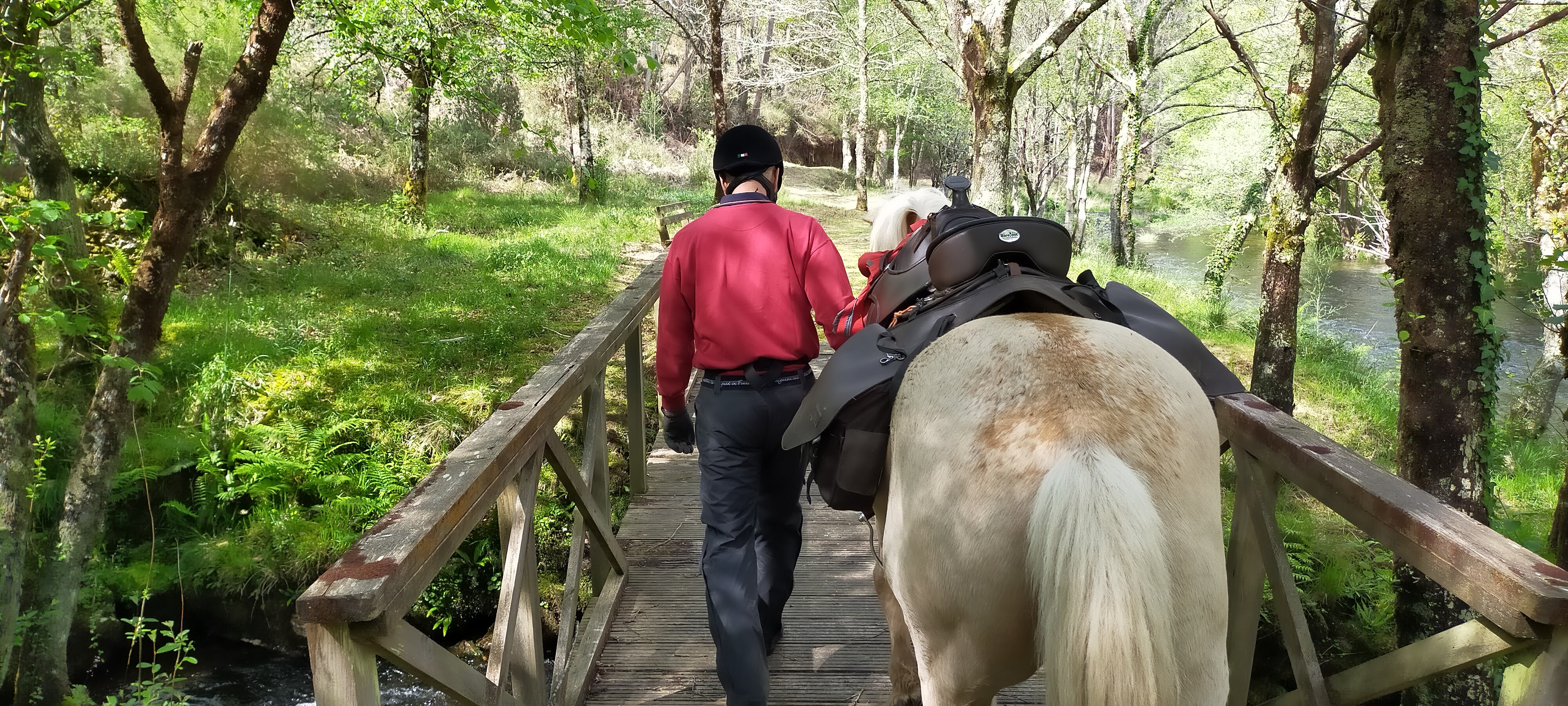
Yes, all our packages start with a short introductory class to help riders get used to the saddle, the horse, and the type of reins we use.
In addition, it’s possible to add ground work or riding lessons to any vacation package, and we also offer packages focused solely on training.
The Natural Horsemanship Camp is perfect for this. It includes an intensive program with both theoretical and practical lessons, combined with participation in the daily care and handling of the horses.
This program covers the basics of ethology, semi-free management, barefoot horse care, training, and rational riding.
We have a diverse herd in terms of origin and breed.
Some of our horses were purchased and trained or re-trained here.
Many of our horses were rescued from difficult situations and rehabilitated to become part of our center’s team.
Although we don’t focus on breeding, one of our mares surprised us last year with a foal, and now our team includes a lively little filly who loves greeting everyone.
As for breeds, we have a crossbreed of Purebred Galician Horse (a small, sturdy local breed), as well as Spanish, Appaloosa, Breton crossbreeds, and a couple of New Forest Ponies that came to us from the UK—they are distant cousins of the Purebred Galician.
We practice respectful riding and care, aligned with the natural needs of the horse as a species.
All our horses live in semi-freedom, barefoot, and mainly feed on pasture and forage. They live in a stimulating environment that allows them to behave naturally.
In training, we aim for healthy riding. We use quality equipment (saddles fitted to each horse, bitless bridles), employ non-violent methods, and make sure not to ask more from our horses than they are ready to give.
The result is a harmonious relationship where effort and work are present, but never at the cost of the animal’s well-being. Our horses are calm and reliable yet lively and expressive, and they are the heart of our project.
Safety and Protective Measures
The horses' living area is protected by a wooden perimeter fence and electric wiring to ensure they remain safely in their living space.
Managing the horses in semi-freedom and their training makes them calm and trustworthy, without showing aggressive or negative behaviors.
Guests are provided with personal protective equipment for all activities, along with handling guidelines to ensure safe interaction with the horses.
Equestrian Tourism Vision

The area’s stunning landscape is undoubtedly a factor—we live in the middle of paradise, surrounded by forests, meadows, cliffs, pristine beaches, and semi-wild rivers.
Additionally, the summer climate here is ideal for equestrian tourism, as it's not as hot as in other parts of Spain. You can enjoy long days of riding without the horse or rider wilting in the heat.
Finally, I believe our online presence conveys a welcoming and friendly image of the project. We’re very hospitable! People who visit us have a great time and often recommend us to others.
Not as much as I would like, but yes.
In general, I believe the sector shares many challenges with other areas of the horse world. It’s essential to be self-aware and work with respect, collaborating with the horse and not taking advantage of its good nature.
Unfortunately, you still see centers with skinny, poorly muscled horses that spend most of the year in a box until the high season arrives… I think it’s crucial to understand that a horse has basic needs that we must meet before working together, and we must also restore respect in training, avoiding violent practices that often stem from fear or ignorance.
In terms of the specific equestrian tourism sector, I think more and more operators around the world are doing excellent work, paying attention to detail and offering authentic experiences that highlight the best of each culture.
The challenges at that level have more to do with access to locations, logistics for certain types of routes, or the difficulty of finding personnel with the right profile to be a good equestrian guide/host.
In Spain and Galicia, we might still lag behind other countries due to the lack of a strong local equestrian tourism culture. There are some very good operators, but in general, national tourists are still discovering this type of offering, which is primarily aimed at international visitors. The natural, ethnographic, and gastronomic heritage surrounding us makes Spain (especially the northern region) an ideal setting for equestrian tourism, which still has enormous development potential.
I haven’t had the pleasure yet, but it’s one of the key equestrian destinations on my list of “must-go” places, and I’m sure the day will come soon. It’s hard to think about horses without Argentina’s Pampas or Patagonia coming to mind…
There are many things drawing me to that trip: the chance to work with Eugenia Fuentes, who I mentioned earlier as an inspiring figure for me, the desire to experience the equestrian tradition of one of the most horse-centric cultures in the world, the Gaucho Derby, and of course… the asados!
I know very little about it and haven’t had the pleasure of riding or working with one.
Final Thoughts:
La Granja Labrada is more than just an equestrian center; it’s a place where passion and respect for horses and nature come together in every detail. We thank Sara for sharing her inspiring story and vision, which undoubtedly makes this corner of Galicia a unique destination for equestrian tourism enthusiasts.

~
Would you like to be part of a group with an equestrian soul?
Join the Ampascachi Community. Obtain exclusive benefits for your holidays.
We tell you how to start, train and take care of your horse.
Interviews with direct providers of riding tours around the world.
Opinions of outstanding equine scientists and personalities in the equestrian sport world.
~
THIS COULD ALSO BE INTERESTING
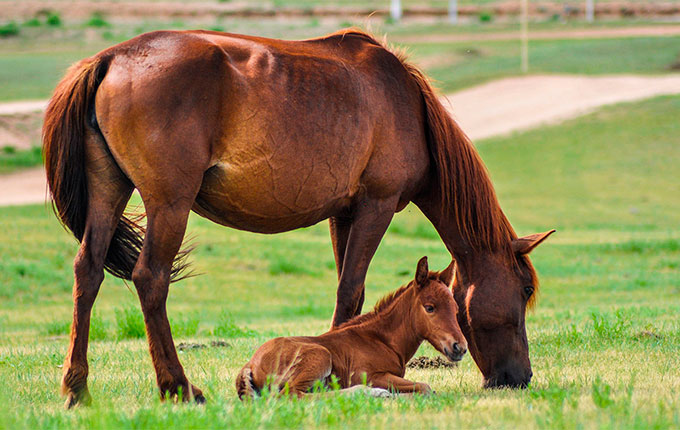
How to understand the welfare of horses
Discover the evolution and implementation of the 5 domains model for animal welfare applied to equids. Assess the well-being of your horse based on his physical and mental health.
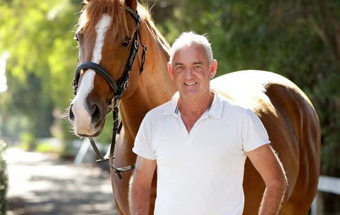
Horse training: Interview with Andrew McLean
Dr Andrew McLean is one of the persons that have had mayor influence in the world of equitation with his books and investigations on the learning behaviour of horses.
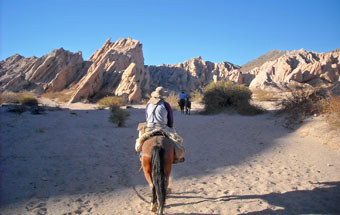
Visiting Northern Argentina on Horseback
Travelling around the north of Argentina on horseback offers you some wonderful options. Riding a horse, you will go through the awesome landscapes of the Calchaqui Valleys.
~
WHAT IS YOUR OPINION? LEAVE A COMMENT
Your comments
Planning your horse riding holidays?
Join the Ampascachi Community. You will get exclusive advantages and guidance for your next horse riding holiday.


 German
German French
French Spanish
Spanish